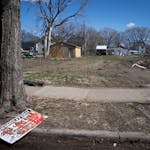A half-million-dollar campaign against sexual misconduct at the University of Minnesota is ramping up this spring.
This week, faculty and staff started taking mandatory online training aimed at preventing harassment and assault. The U recently hired a marketing firm to design a public awareness campaign to roll out later in the year. It's also recruiting for a staffer who will expand existing training for students, with a new focus on encouraging bystanders to intervene when they witness sexual misconduct.
President Eric Kaler and other top administrators filled in the Board of Regents on the initiative, launched last year on the heels of a string of high-profile incidents in which student athletes and U officials faced allegations of harassment and assault.
"We know there is a problem in society; we know there is a problem on our campus," said Kaler, who called sexual misconduct "an epidemic."
"It has got to stop."
Kaler's administration also issued its official response to a report released last summer on its handling of 2016 sexual assault allegations against a group of Gophers football players. That response goes over changes made since the report, including revisions to the student athlete conduct code, stricter rules for visits by athlete recruits and possible changes to the sexual misconduct hearing process under consideration, such as bringing in retired judges to preside over such hearings.
The U has dedicated $540,000 to kick off the initiative, but an official said more investment is likely in what is seen as a multiyear effort. The Twin Cities campus is hosting a conference on sexual misconduct prevention in March.
"This effort is a marathon, not a sprint," said John Finnegan Jr., dean of the School of Public Health, who is leading the initiative with Karen Miksch, an associate professor of higher education and law.
The U's Office of Equal Opportunity and Affirmative Action received 170 reports of sexual misconduct by students and campus outsiders in fiscal 2017, up from about 50 two years earlier. It also fielded 37 reports of such misconduct by employees.
The regents cheered the administration's prevention push and voiced hope that the U will become a national trendsetter. They also stressed recent steps are only a start.
Regent Abdul Omari said he was taken aback when he learned the university required only one 45-minute training session. But he said he was reassured that the university has a plan to build on that within academic departments.
Regent Michael Hsu stressed that prevention efforts could founder unless the university gets better at responding when students and employees affected by sexual misconduct come forward. He says concerns persist that those who complain about misconduct, including graduate students working on campus, might face repercussions.
"I am not sure how we move past that," he said.
Trish Palermo, the Minnesota Student Association president who sits on a prevention initiative advisory body, said the effort is drawing positive feedback from students.
"Students appreciate this is a clear priority," she said.
She said association members and other students generally support a requirement that faculty and staff report sexual misconduct allegations to the U's Title IX coordinator, a rule the U adopted after the departure of former Athletic Director Norwood Teague amid charges of sexual harassment.
The requirement has faced some pushback, including concerns it might make victims more reluctant to come forward. But Palermo noted victims decide whether to pursue a complaint after a report is lodged with the coordinator.
She said the discussion about the initiative spurred a number of reports from teaching or research assistants about harassment by faculty.
"That's a huge issue on campus — graduate students being taken advantage of by the faculty they work for," she said.
Abby Honold, a prominent campus advocate for sexual assault survivors, said she is encouraged by Friday's update on the initiative, including its focus on promoting bystander intervention: "I love that President Kaler is attacking the issue from multiple angles."
She said she would like to see more resources for the campus Aurora Center, which provides services for students and others who have experienced harassment and assault. Last fall, Honold and other students launched a fundraising campaign for the center, which has seen a marked increase in reports. The student association plans to lobby for more direct funding from the U for the center.
Honold said she wants to see the university engage with Minnesota high schools.
"The university has a lot of clout in this area," she said, "and they can really make a difference in lobbying for sexual consent education."
Separately, the regents tabled a change to the student code of conduct that would make it easier to hold groups on campus accountable if their members engage in misconduct.
At the end of Friday's meeting, a group of students and faculty confronted U leaders about the change, which they worry might lead to retaliation against groups whose members engage in peaceful protests on campus. Kaler and Regents Chairman David McMillan promised to hold a public forum on the revision, which they said had drawn much input from the campus community.
"You are right," Kaler said. "We did not follow the usual process. We did not have a thorough review."
Mila Koumpilova • 612-673-4781




